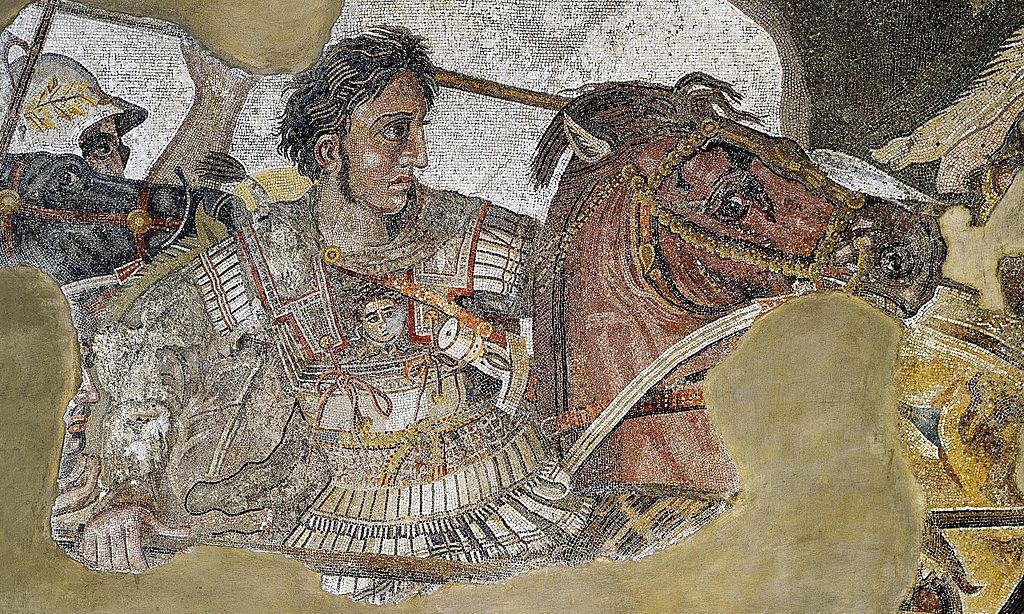Indians strike
The battle was savagely fought. As the volleys of heavy arrows from the long Indian bows scythed into the enemy’s formations, the first wave of war elephants waded into the Macedonian phalanx that was bristling with 17-feet long sarissas. Some of the animals got impaled in the process. Then a second wave of these mighty beasts rushed into the gap created by the first, either trampling the Macedonian soldiers or grabbing them by their trunks and presenting them up for the mounted Indian soldiers to cut or spear them. It was a nightmarish scenario for the invaders. As the terrified Macedonians pushed back, the Indian infantry charged into the gap.
In the first charge, by the Indians, Porus’s brother Amar killed Alexander’s favourite horse Bucephalus, forcing Alexander to dismount. This was a big deal. In battles outside India the elite Macedonian bodyguards had not allowed a single enemy soldier to deliver so much as a scratch on their king’s body, let alone slay his mount. Yet in this battle Indian troops not only broke into Alexander’s inner cordon, they also killed Nicaea, one of his leading commanders.
According to the Roman historian Marcus Justinus, Porus challenged Alexander, who charged him on horseback. In the ensuing duel, Alexander fell off his horse and was at the mercy of the Indian king’s spear. But Porus dithered for a second and Alexander’s bodyguards rushed in to save their king.
Plutarch, the Greek historian and biographer, says there seems to have been nothing wrong with Indian morale. Despite initial setbacks, when their vaunted chariots got stuck in the mud, Porus’s army “rallied and kept resisting the Macedonians with unsurpassable bravery”.
Macedonians: Shaken, not stirred
Although the Greeks claim victory, the fanatical resistance put up by the Indian soldiers and ordinary people everywhere had shaken the nerves of Alexander’s army to the core. They refused to move further east. Nothing Alexander could say or do would spur his men to continue eastward. The army was close to mutiny.
Says Plutarch: “The combat with Porus took the edge off the Macedonians’ courage, and stayed their further progress into India. For having found it hard enough to defeat an enemy who brought but 20,000 foot and 2000 horse into the field, they thought they had reason to oppose Alexander’s design of leading them on to pass the Ganges, on the further side of which was covered with multitudes of enemies.”
The Greek historian says after the battle with the Pauravas, the badly bruised and rattled Macedonians panicked when they received information further from Punjab lay places “where the inhabitants were skilled in agriculture, where there were elephants in yet greater abundance and men were superior in stature and courage”.
Indeed, on the other side of the Ganges was the mighty kingdom of Magadh, ruled by the wily Nandas, who commanded one of the most powerful and largest standing armies in the world. According to Plutarch, the courage of the Macedonians evaporated when they came to know the Nandas “were awaiting them with 200,000 infantry, 80,000 cavalry, 8000 war chariots and 6000 fighting elephants”. Undoubtedly, Alexander’s army would have walked into a slaughterhouse.
Hundreds of kilometres from the Indian heartland, Alexander ordered a retreat to great jubilation among his soldiers.
Partisans counterattack
The celebrations were premature. On its way south towards the sea, Alexander’s army was constantly harried by Indian partisans, republics and kingdoms.
In a campaign at Sangala in Punjab, the Indian attack was so ferocious it completely destroyed the Greek cavalry, forcing Alexander to attack on foot. In the next battle, against the Malavs of Multan, he was felled by an Indian warrior whose arrow pierced the Macedonian’s breastplate and ribs.
Says Military History magazine: “Although there was more fighting, Alexander’s wound put an end to any more personal exploits. Lung tissue never fully recovers, and the thick scarring in its place made every breath cut like a knife.”
Alexander never recovered and died in Babylon (modern Iraq) at the age of 33.



